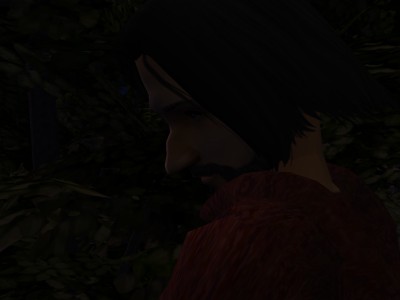
His lord sometimes said that night did not fall in the valley, but came to it as a dark flood, rising up from the shadowy hollows until the valley floor was covered, and then the flanks of the hills, and finally overbrimming the hills themselves, and then it was night indeed, as far overhead as one could see.
Egelric had seen far more dusks than dawns with Alred, but he thought that his lord might find the metaphor apt at sunrise as well. The dawn was like a slow retreat of the waters, exposing first the highest peaks of the hills in the clear, red light, and then the foothills, and gradually revealing the farms and fields and forests of the valley until only the deepest hollows remained unlit, for those were never quite drained of their shadow, and they seemed to be the wellsprings of the dark.
As far as Egelric could tell, this had indeed been a flood that had prevailed upon the earth a hundred and fifty days. It was a great relief to see the sunlight rimming the peak of Thorhold, where ravens did come to roost, if not doves. Now he could go home and sleep an hour or two before getting on to his work.
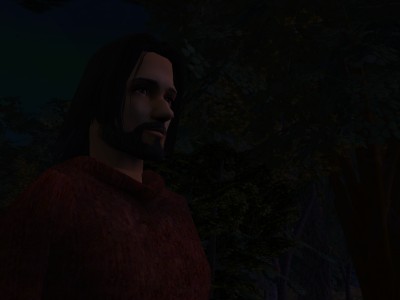
He had walked nearly all the night, so it was a weary tread that carried him into the forest and up the hill towards Nothelm keep. He had, of course, seen and heard nothing. He had nothing to show for his monthly vigils except for the night of October, when he had saved Sela.
He had no particular reason to believe that the woman had even continued her predations, except that Theobald had continued having his dreams on nights of the new moon. Theobald said he would have preferred staying awake those nights himself, but Egelric had asked him to continue dreaming. The dreams were the only clues they had.
As he neared the edge of the woods and the branches overhead thinned, he saw that the sky had a sickly, leaden color after the long night of starless obscurity. The cloudbank was low and seemed to rest heavily on the hilltops like a lid. The sunlight would not reach the valley at all today, unless it slipped for a moment between two peaks to illuminate the clouds’ bellies before the sun rose above the level of their backs. It would be a good day for drying mortar, he thought to himself with a sigh, but a poor day for the spirits when one was as exhausted as he, and had wasted one’s night.
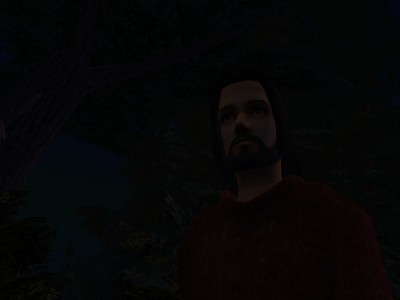
He was nearly onto the downs when he heard a soft voice call his name.
He froze, and his heart contracted in fear for her. It was still quite dark, and he did not know at what hour the woman ended her hunt. He drew his knife, in case the sound of an elfin voice would be enough to attract her.
“Egelric!” she called again, as if she meant to keep her voice quiet, but feared he was not hearing her.
“Whisht!” he warned. “It isn’t safe!”
“Egelric?”
“The devil! Where are you, then?” he sighed.
“Egelric, I talk you.”
“Aye, you talk me, you talk me.” He walked off into the brush in the direction of the voice. “Go ahead! Talk me. I can’t find you.”

“Egelric!” she giggled and clapped her hands as he nearly stumbled over her.
“There you are!” He crouched beside her. “You little fool,” he whispered. “It isn’t safe!”
“I talk you.”
“Aye, you talk to me. I suppose you want a fire, too?”
“You make fire!” she cried happily.

“Whisht! No fire!”
“No fire,” she frowned.
“What about Hel?” he asked softly.
“No Hel, no Hel,” she said as if she meant to assure him of the woman’s absence.
“It’s still dark. Do you call it morning already?”
“Good mornin’!”
“Aye, good morning,” he said, finally breaking into a weary smile as he sheathed his knife and came to sit beside her. “You pick out the parts you know, don’t you?”

“Good mornin’ how to you?”
“How are you? You have a problem with that one.”
“How are you to day?” she said carefully.
“Very well said. I am very tired today. I walked all night.”
“To day…” she repeated slowly.
“I am tired today. Tired.”
“Tired today.”
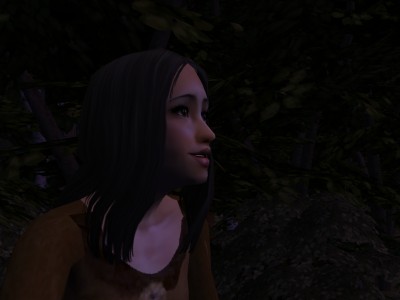
“That’s right. Tired. I need to sleep. Sleep.” He lay down with his head on his arm and pretended to snore.
Sela giggled. “Seleep.”
“Something like that.” He sat up again and said, “I go home, I sleep.”
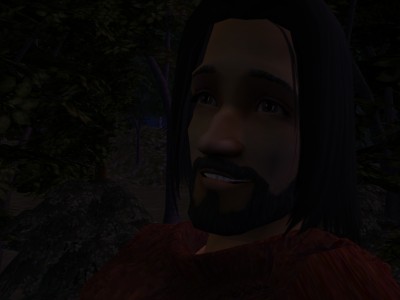
“No you go home,” she pouted. “You seleep… me,” she said, patting the leaves beside her.
Egelric fell back onto the ground and laughed aloud, regardless of the elves or the woman Hel or anyone else who might have thought him mad. After a moment’s confusion Sela began to laugh heartily as well.
“Bless you, you have no idea what you are saying,” he said.
“Pless you!” she said eagerly.
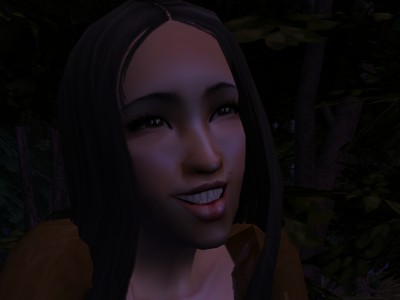
“I sleep at home,” he said slowly. “I go home, I sleep.”
“No you go home, no you seleep! No you seleep – how you call – how you call dis?” she asked, waving her arms widely at the forest surrounding them.
“I don’t know… trees? Tree?” he asked, sitting up to pat a nearby trunk.
“Taree?” she asked dubiously, staring up at the tall beech. “You seleep taree?”
He laughed. “No, I mean forest. A forest is many trees. Tree, tree, tree, tree,” he said, pointing at the trees around them. “Forest,” he said, waving at the lot of them.
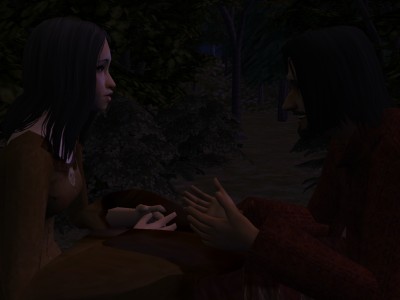
“Vorest. No vorest,” she said, shaking her head sadly. “What you call dis?” she asked, pointing directly overhead.
“I don’t know. Sky?”
“Sssky?” she said painfully. “No you seleep sssky.”
“No, I do not intend to sleep in the sky. What do you mean to say? Do you mean the morning?”
“Good mornin’!”
“Do you mean I shouldn’t sleep in the morning?”
“What you call dis?” she gasped.
“Morning?”
“Mornin’ you call dis?”
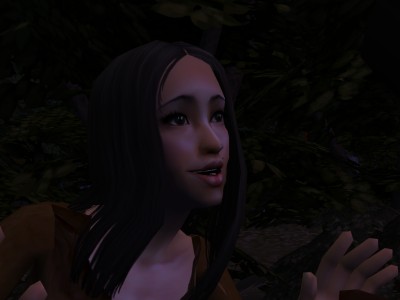
“Aye,” he smiled. “Evening, sleep,” he said, and he laid down again and pretended to snore.
“You seleep good evernin’.”
“Morning, wake,” he said, and he sat up and stretched as if he were waking after the long night of sleep he had missed.
“You wake good mornin’.”
“No. I sleep in the evening, I wake in the morning.”
“I seleep in de evernin’,” she repeated slowly. “I wake in de good mornin.’”
“I wake in the morning.”
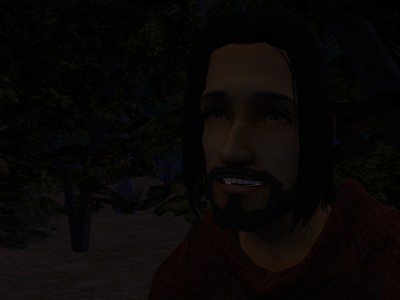
“I wake in de mornin’.” She laughed and clapped her hands, and her face shone with the delight of understanding. “I talk you in de mornin’. No you seleep in de mornin’. Egelric!”
He grinned at her giddiness. “Sela!”
She smiled and sighed as if she were full of things she would have liked to say.
“But I am tired, Sela,” he said gently. “I walked all night – all evening. Look.” He sent the fingers of one hand walking across the palm of the other. “Walk. I walk in the evening. Now I sleep in the morning. I go home, I sleep.”
“You see in de evernin’ Hel,” she said sadly.
“No, I did not see Hel.”
“You see in de evernin’ Hel. You see in de evernin’ me. You make in de evernin’ fire.”
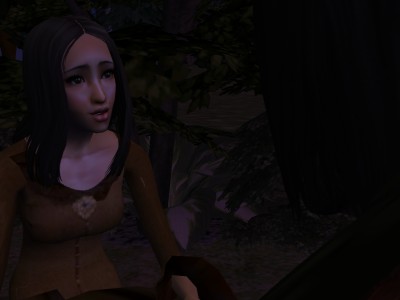
“Evening, Sela. Eve-ning. I make fire in the evening.”
“Eve-nin’.”
“That’s close. I saw Hel in the autumn. That was a long time ago.”
“In de autumn…”
“In the… Sela! Look.” He took a dead leaf from the ground and held it up before her. “Leaf.”
“Leave.”
“Leaf. Now, tree drops leaf.”
“Taree drop leave!”
“Tree drops leaf, that’s autumn. In the autumn, the tree drops its leaves.”
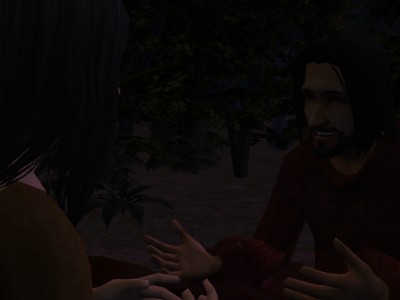
“In de autumn! Taree drop leave!” Again she laughed and clapped her hands. “I see Egelric in de autumn.”
“That’s right,” he said, laughing with her.
“What you call dis?” She asked excitedly and shook a branch on a nearby bush. “Taree hold leave.”
“Now? This is the spring. Spring.”
“Ssspa-rin’.”
“Oh, my, that’s not close at all. Spring.”
“Sssprrrin’.”
“Not bad. We have spring, summer, autumn, winter. Do you understand? Spring, the tree has new leaves. Summer, hot,” he said, fanning his face with his hand. “Autumn, tree drops leaves. Winter, cold,” he said, and he pretended to shiver.
“Summer, hot, winter, cold. I see you in de summer,” she said excitedly.
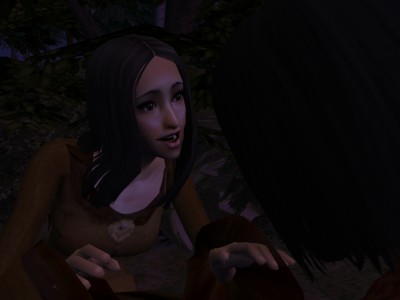
“You haven’t yet,” he smiled. “Are you making plans? I don’t think you should be seeing me at all.”
“I talk you in de summer. You make fire in de summer.”
“No, I do not! Summer, hot. No fire.”
“You make fire in de evenin’ summer,” she insisted. “I see you, you make fire.” She gestured with her arms as if to indicate a very large fire.
“Oh! You mean the Midsummer Eve. Midsummer evening,” he corrected for her benefit. “Midsummer evening, we make a big fire,” he said, repeating her gesture.
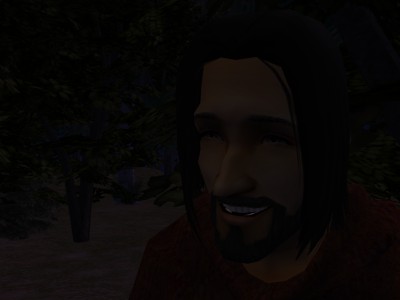
“You see me in de midsummer evenin’. Man see elf in de midsummer evenin’.”
“Oh, is that so? Men see elves on Midsummer Eve?”
“I talk you in de midsummer evenin’.”
“Oh, Sela, I wouldn’t recommend that. If the other men can see you, they will never allow me to keep you to myself.”
“You go vorest in de midsummer evenin’. You talk me in de midsummer evenin’.”
“Sela, Sela,” he sighed. “I don’t think it’s a good idea.”
“I see you in de sssprrrin’, see you, see you. I see you in de midsummer evenin’. I see you in de autumn, I see you in de winter. You make fire in de midsummer evenin’. You make fire in de winter, you make fire, fire, fire.”
“By God, I believe I have taught you how to babble.”
“Egelric,” she sighed wearily and began again. “I see you in de midsummer evenin’. You make fire in de midsummer evenin’. I talk you in de midsummer evenin’.”
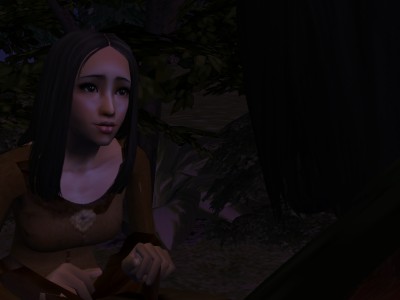
“Aye, aye, I see you, I see you.”
“You make fire in de midsummer evenin’, you go vorest in de midsummer evenin’, you see me in de midsummer evenin’.”
“If you insist,” he smiled.
“You see me in de – ”
“I see you in the midsummer evening, aye. I shall come to the forest, though I fear I shall regret it.”
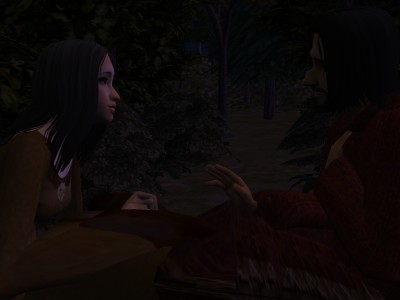
She smiled and sighed in relief at finally having been understood.
“But now perhaps you will let me go home?”
“You go home,” she agreed. “You seleep in de mornin’.”
“Good,” he said, and he stood and brushed the leaves and dust off of his cloak. “And you, you go home and frolic, or whatever it is that elves do during the day.”
“Good day,” she said, still smiling up at him, though she did not rise.

He hesitated, at a loss to see her remain seated, for he had an awkward feeling that he should kiss her, or something… or her hand, or something… But then he thought that it would probably be a bad idea, and so he simply said, “Good day,” and bowed as politely as if she were a stranger – though a lady – and turned to go up out of the forest onto the downs.
He was surprised to see at how short a distance her brown dress and dark hair and harelike stillness allowed her to disappear into the backdrop of brush – so short indeed that he could scarcely believe that she was yet there – so still that he wondered whether she had ever been there at all.






My favorite line would have to be "By God, I believe I have taught you how to babble." LOL